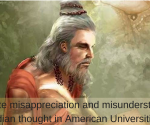The American Guilt Syndrome
The subconscious mind of a victim of heinous crime often responds to the trauma by developing a Victim’s Guilt Syndrome, which is a psychological defense mechanism to stop having to deal with an external adversary. This is accomplished by internalizing the adversary within the victim’s own notion of selfhood. For instance, rape victims are often known to acquire guilt, as a rationalization that rape was their own fault and that they even deserved it. Fearful of dishonor to their families, they hide in shame over their status as rape victims. A variation of this pathology exists amongst some kidnapping victims, a prominent example being the case of Patricia Hearst. After being kidnapped by a terrorist organization, named The Symbionese Liberation Army, in the 1970s, this young woman from a billionaire family joined her captor’s ideology.
Utilizing this human tendency, colonialists engineered the minds of their subjects into an inferiority complex as part of the psychology of governance; and then ‘upgraded’ the status of a small slice of the ruled community to be the sepoys (with physical power) and the Macaulayites (with intellectual power) to help rule over the rest. This also happened to the Irish, in the form of a new category of Irish being created by British rulers, that was called the Anglo-Irish. This syndrome is the basis of ‘Hindu shame’ that is so prominent on many American campuses today, with Indian American Macaulayite faculty members becoming the role models of self-hate.
In the wake of the terrorist attack, are we as Americans being made to feel guilty of having caused the terrorism of which we are the victims? The topic, ‘Why did America cause hate against itself?’ has become a common theme for college discussions in the past three weeks. Most anti-war activism is rooted in the theory that US foreign policy and Israel’s attitude towards Palestinians caused Islam to become nasty. Hence, Americans are being asked to accept the responsibility for their own victim-hood, and to be apologetic to the Muslim world.
However, Islamic jihad predates Israel and the existence of the United States by a thousand years. For 1,300 years, a great many individuals, societies and rulers have interpreted Islamic jihad as a license to kill infidels and as a mandate for expansionism. The 7th century invasion of Sindh (India) by Arabs was explicitly celebrated as jihad, and history is filled with one wave of Islamic plunder of India after another. Modern day Afghanistan and Pakistan were largely Buddhist until these conquests. The Taliban’s atrocities look benign by comparison. These Islamic jihads, such as those by Mohammed of Ghazni, Ghauri and all the way down to Aurungzeb, were not rationalized by the conquerors based on any dispute. Rather, these were justified as wars to kills infidels and to destroy their idols. Therefore, attempts to rationalize terrorism by blaming US and Israeli policies ignore the history of jihad that precedes the existence of the United States and Israel. This guilt is part of the denial and internalization of the problem, so as to avoid dealing with the external reality that appears too ominous.
Today’s leftist anti-war ideology is based on the communist struggle against capitalism, and this is the wrong framework to analyze the problems of Islamic terrorism. The Taliban are not fighting for economic development or modernization the way communist terrorists did. Islamic fundamentalists are fighting against the forces of modernization in general, as these seem to threaten the stranglehold of fundamentalist dogma and the power of the clergy. They are equally against capitalism and communism, and against any model for secular ‘progress’. The leftists need a new ideology today, since the ‘communism versus capitalism’ dialectic is obsolete and irrelevant. Unfortunately, many leftists are left with slogans and anger but no resources to bring to the 21st century.
I am disappointed that very few leaders from the Islamic public relations machinery, which has swung into rapid deployment, call for honest introspection on the part of Islam itself, especially to re-examine its own policies towards non-Muslims. Islamic law divides the world into two categories: ‘dar-ul-Islam’ (the world of Muslims) and ‘dar-ul-harb’ (the world of non-Muslims, also called kafirs). Muslim law demands different standards and norms by which Muslims must deal with insiders and outsiders. Such built-in chauvinism towards others is dangerous and deserves public attention. Pan-Islamic organizations should focus on Muslims’ respect and responsibilities towards others, and not just push for greater rights and privileges for Islam.
In medieval Europe, Muslims tolerated Jews better than the Christians did. But in the 20th century, minority religions have been oppressed in Islamic countries. Rights of non-Muslims in Islamic countries need to be made comparable to the rights that Muslims demand for themselves in the west. Islamic leaders should create Islamic commissions and forums on pluralism, where non-Muslims could submit complaints and get a fair hearing on instances of Muslim hate speech against infidels, prejudicial laws or practices in Islamic countries towards non-Muslims, and crimes committed in the name of Islam. They should reject Islamic triumphalism, since it has led to ‘religious cleansing’ of religious minorities in virtually every Islamic state since World War II (as evidenced by a decline in the percentage of religious minorities). No religion is free from radical elements, and no religion is essentially radical. There are many moderate and liberal Islamic scholars, but they fear the clerics, and their voices are subdued.
Pan-Islamic global organizations have a westernized face of peace and tolerance, in contradistinction with a different internal face of Islam back home. The rulers of Islamic societies who deal with the west are projecting an image that is democratic and peace-loving, whereas the Muslim clergy who control the religious teachings and interpretations often tend to be radical exclusivists and expansionists. Hence there is a ‘westernized Islam’ practiced by a small elite and a different ‘native Islam’ practiced by the vast majority. This has resulted in a good guy / bad guy role-playing, in which Islamic lobbyists are the good guys claiming to save the west from some bad guys of Islam.
Unlike Christianity, Islam has resisted attempts at reformation and enlightenment, to secularize and / or pluralize it. Since the Sunni Muslim law was frozen by order of the caliph in the 10th century, the only mechanism which exists in Islam to update the law is the ‘fatwa’, which may be considered as the case lawof Islamic jurisprudence. There are many ‘muftis’ who can issue fatwas, and the Holy Quran and the Hadith are often misinterpreted to promote extreme positions. The equivalent situation would be if Christian churches were criminal courts, in which preachers were judges, empowered to issue harsh verdicts for violation of Christian law.
Islamic leaders should immediately set up a panel to amend the sharia (Islamic Law), especially as it pertains to non-Muslims, so as to be compatible with democracy and pluralism. Either they should delete references to non-Muslims entirely, or else they should invite non-Muslim representatives from all religions to participate in formulating balanced, ethical, and fair norms for treating non-Muslims. They should invite and encourage critical examination of Islamic history and texts by all, without intimidation, just as is common for other world religions.
Before proclaiming any and every fight by a fellow Muslim anywhere in the world as a freedom struggle, Islamic leaders must first introspect: could a religion whose clergy subverts the freedom to disagree, the freedom to question and doubt, the freedom of other religious choices and of democracy, be capable of fighting for freedom? Freedom must begin at home.
The dialog between the west and Islam should involve such introspection by both sides. Meanwhile, Islam, Inc.’s unholy media war should voluntarily ceasefire.









